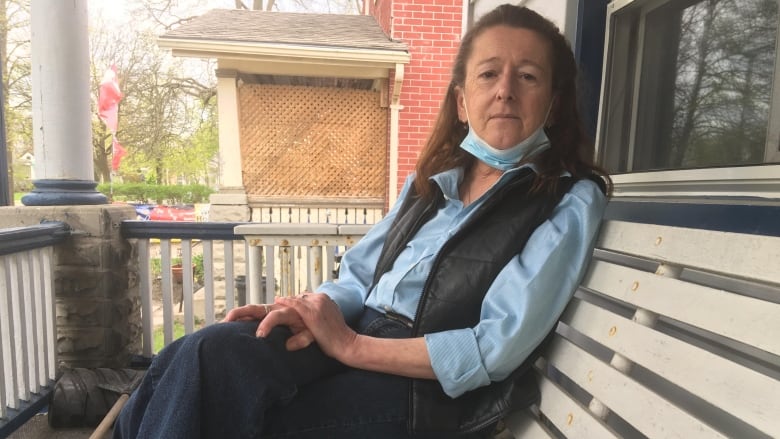CBC News: The dreaded N12: It’s cost her 3 apartments and 3,363 issued in Ontario last year
Posted May 10, 2021
Posted May 10, 2021
 When the N12 form was handed to her, Virginia Pratten didn’t need someone to explain what it meant.
When the N12 form was handed to her, Virginia Pratten didn’t need someone to explain what it meant.
She’d been issued the form before. Twice before, in fact.
She knew it meant the beginning of the end of her four-year tenancy in a one-bedroom apartment she loves, situated in an older home in London’s SoHo neighbourhood.
“I’m really not exaggerating, it’s horrific,” said the 62-year-old about the eviction notice. “Moving is hard and rents have just gone crazy. I’m finding there’s very little I can afford. I can’t eat or sleep. I’m just beside myself.”
The N12 is a form a landlord is required to issue to tenants under Ontario’s Residential and Tenancies Act to notify them about an intention to have either themselves, or a relative, move into a rental unit.
It’s one of the few ways a landlord can get a tenant to vacate when the tenant hasn’t violated the terms of the lease, for example, by failing to pay rent.
Sometimes N12 forms used ‘in bad faith’
In Pratten’s case, the N12 was issued in March shortly after the house was sold to a new owner. Pratten said she’s a good tenant who’s never been late with the rent. She has nothing but praise for her current landlord.
“When the house was for sale, my heart was in my mouth because I wondered if I would have to move,” she said. “Sure enough, when the house sold, I was told the new owner would require this apartment.”
The tenant advocacy group ACORN filed a freedom of information request with Ontario’s Landlord Tenant Board to see just how many N12’s were issued last year. The answer? A total of 3,363 provincewide. Figures for London weren’t available.
While not commenting on Pratten’s situation, ACORN London co-chair Nawton Chiles believes that in some cases, the real reason a landlord files an N12 application is to get a tenant out, not a relative in.
“Most of the time it is legit,” he said. “However, sometimes people will use these in bad faith to evict a tenant, have a relative come in for a few weeks or months, then sign a new tenant at a much higher rent because the market is so hot here. Some of our members in the London chapter have had this happen to them.”
Lawyer Ian Dantzer works with Community Legal Services, part of the law faculty at Western University that helps people who can’t afford a lawyer.
He said more than 3,363 N12 evictions in 2020 is a number that raises red flags.
“It is perceived as a tactic of landlords to get the tenant out,” he said. “It just seems impossible that that many people want the place for themselves or a relative.”
This is the third time Pratten has had to leave an apartment after a landlord issued her an N12. On one occasion, she later learned the landlord’s relative did not move in.
“Apparently it was a change of plans,” she said.
The law requires a landlord to give a tenant two months’ notice to vacate when issuing an N12, which happened in Pratten’s case. The house’s new owner has said his son will move into the one-bedroom apartment Pratten now occupies, and she said she has no reason to believe this isn’t genuine.
But even if legitimate, it puts her in a tough spot. Pratten’s only income is through the Ontario Disability Support Program and a government pension. She’s paying $670 inclusive and most comparable apartments she’s looking at are north of $1,000, which would eat up about half her monthly income.
Surging rental market
Prices in London have surged since she moved in to the SoHo house almost four years ago.
“I could easily be spending my entire income on rent, the way the market is.”
Landlords are allowed to raise the rent on existing tenants, but only by an annual percentage set by the province. In recent years, it’s hovered around two per cent.
Chiles said that in a rapidly rising rental market, landlords can become motivated to get long-term tenants out any way possible to collect a rent closer to the going rate.
There are fines for using the N12 in bad faith, but often higher rents more than cover any potential fines.
Pratten has to be out by June 1 and has had no luck finding a new place. She’s asking everyone she knows, even her Canada Post deliverer, about any available place in her price range.
Chiles said tenants can challenge an N12 at the Landlord and Tenant Board, and while Pratten has looked into that, she said she’s too exhausted to launch a battle she might lose.
Chiles said ACORN wants to see a licensing system created for landlords so those who use the N12 repeatedly or in bad faith could be easily flagged.
He’d also like to see proactive inspections by city officials to ensure that landlords follow through on stated plan to move a relative in.
“If it’s a pattern and it keeps happening from the same landlord or property management company, there could be fines.”
***
Article by Andrew Lupton for CBC News
